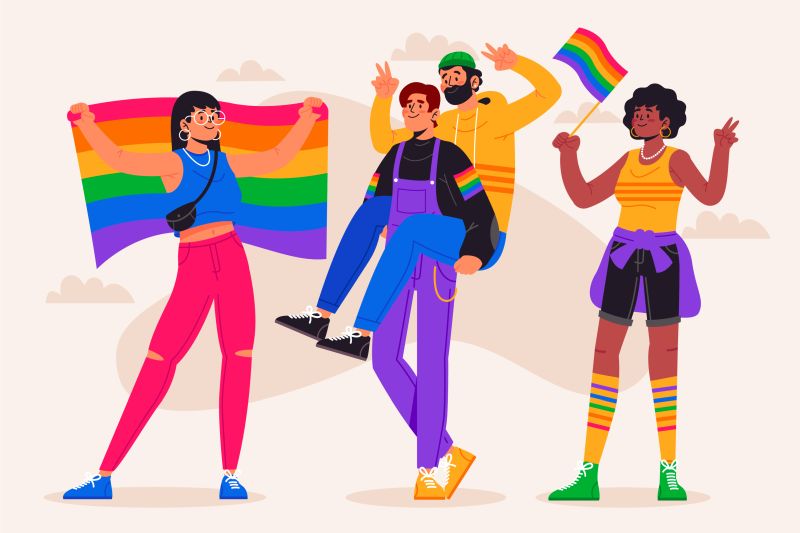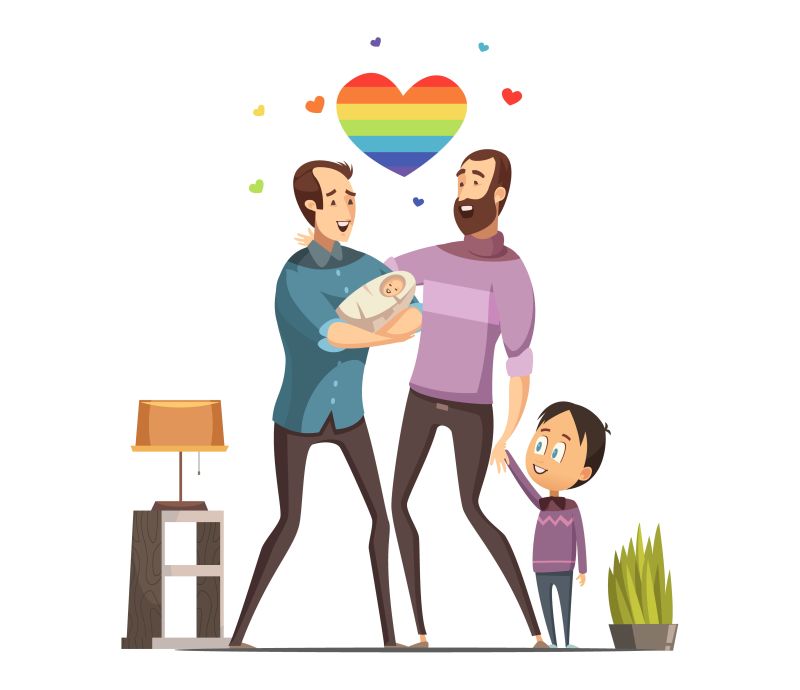Human rights of LGBTI persons
Rights of LGBTI persons are not rights of an isolated group, their protection and promotion aren’t something out of the ordinary that should be justified as a type of “addition” to the usual state. The term “LGBTI human rights” doesn't include some special rights, but rights that belong to all persons (no matter their race, gender, sexual orientation, nationality etc.), and they are being violated or taken away from LGBTI persons just because they aren't heterosexual or cisgender.
When we talk about LGBTI persons’ rights we talk about legal means which hinder the violation or diminution of these rights. The Constitution of the Republic of Croatia in Article 14 ensures that everyone is equal in front of the law and that nobody’s rights can be taken away or diminished based on certain characteristics. Although it is not explicitly mentioned in the declaration, sexual orientation and gender identity are part of those characteristics. This equality assurance applies to all rights and freedoms, which means that everyone, regardless of their sexual and gender identity, must be able to enjoy all their freedoms.

So that this constitutional promise of equality may be fully reached, multiple acts ensure protection mechanisms. The ban on discrimination is presented in more details in The Anti-Discrimination Act. It reinstates what is already mentioned in the Constitution, that it's forbidden to take away or diminish someone’s rights based on that person’s characteristics - the Act specifically names sexual orientation as one of these characteristics. Apart from that ban on discrimination, the Act recognises in detail the different forms it can take. For instance, it is forbidden to directly act in a way which would bring a certain person in a disadvantage compared to a heterosexual person based on their sexual orientation (direct discrimination). Discrimination based on an apparently neutral “regulation, criteria or practice” which puts persons that aren't heterosexual in a disadvantage compared to those that are heterosexual are also forbidden (indirect discrimination). Discriminatory actions also include harassment and sexual harassment, as well as segregation based on certain characteristics, once again including sexual orientation. Apart from regulating a whole variety of issues related to discrimination such as incitement to discrimination and protection from victimization, the Act regulates mechanisms that can be used by persons as protection from discriminatory actions. Thanks to this act, persons can report discrimination and the violations of their rights in different areas of life: in hiring, at the workplace, in the healthcare and social care systems, related to housing, while receiving or using services and so on.

There are two crucial institutions for combating discrimination. One is especially important for gender equality and the protection of LGBTI persons: Gender Equality Ombudsperson. Her authorities are regulated by the Act on Gender Equality. It further regulates gender-based discrimination and promotes equality as one of the highest values of the Croatian legislation. According to the Act, “gender equality means that women and men are equally present in all areas of public and private life, that they enjoy the same status, same possibilities for enjoying all rights, as well as equal benefits from achieved results”. (Article 5 of the Act) More information is available on the institution’s web page. On the same page one can report discrimination.
The Ombudsperson (Ombudswoman) is the other important institution, the central one in charge of enforcing the Anti-Discrimination Act. Although they are not specialized for gender equality and rights of LGBTI persons, one can report all other cases of discrimination and violations of fundamental rights and freedoms to this institution. More information about this institution, it's jurisdictions and forms of protection against discrimination is available on the webpage of the Ombudswoman.
In Croatia we witnessed human rights of LGBTI persons being brought into question, especially during the referendum in 2013 by which marriage is in Croatian Constitution defined solely as union between a man and a woman. Although this definition removed the term “marriage” from families in partnerships that aren’t heteronormative, it’s important to note that it only omits the use of the term “marriage” in a legal way for such families. All other rights related to personal and family life must be available to all, including LGBTI persons. That's why the Life Partnership Act is especially important: it acknowledges both formal and informal life partnerships. Informal partnership is close to domestic partnership and includes the family life of two persons of the same gender, even though formally not recognised, which after a while gain most of the rights that are recognised for such partnerships. Formal partnership has the same effect and is registered in the courthouse in an act similar to marriage.
Of course, the realisation of these rights from personal and family life is met with obstacles that are only being resolved through litigations. Based on these litigations, it's been undoubtably proven that same-sex couples have the right to foster children based on the Foster Care Act. Since 2022, same-sex couples can apply for foster care and the sole fact of having a life partner cannot be taken as a reason to prevent fostering. Life Partnership Act also regulates potential relationships with children: it protects the right of the life partner to “achieve parental care of the child, meaning parental care together with the parents or instead of the parents based on a court decision”, according to the Family Act. Article 91 of the forementioned law says that parental care includes “responsibilities, duties and rights of the parent with the goal of protecting and promoting the child’s personal and property rights and wellbeing”. Parenthood in the case of same-sex couples is also being protected by partner care. In the case of the child's parent, who is in a life partnership, passing away, or in the case they are still alive, but their parental rights have been taken away or the other parent is unknown, after the court decision, the partner-guardian gains parental care, effectively turning them (a person in life partnership) into a parent.

Although the law offers assurance of fundamental rights, there are constant rebuttals. For these to be resolved in favour of strengthening the current state, it's important that everyone stands up for their own equality. It's therefore crucial to report every case of discrimination or other forms of rights and freedom violations, regardless if it is happening in school, at university, the workplace or at home, by whom and under which justification. We invite everyone to pay special attention to the possibilities offered by the ombudsperson system, to educate themselves and help in building rights of LGBTI persons and a legal state in general.
Violence and hate crime
Legally there are means meant for dealing with especially hard violations of fundamental rights of LGBTI persons. In those cases, the state has the grounds to react with repressive apparatus: Criminal Procedure Code is especially important for that. For instance, it predicts the criminal offence of equality violation which allows sanctioning in the form of jail to those that deny, restrict or condition the rights of others to “receive goods or services, rights to pursuit business, get employed and advance” based, among other, solely on sexual identity, or the one that gives benefits to others based on the same thing. Further on and even more important, it’s stated by Criminal Procedure Act that any hate crime, unless there is already a harder punishment stated for it in the law, will be treated as an aggravating circumstance. This allows legal authorities to show special rebuke of the community towards the crimes motivated by hate, including crimes towards LGBTI persons, even if the legislator missed the opportunity to give a harder punishment for those cases.
Hate crimes are punished harder and are treated with more disapproval from the community because these are crimes that affect a victim only because they belong to a certain group or because one believes they do. That’s why in their core, alongside hard violations of other’s rights, hate crimes include certain prejudice. It’s released in an especially extreme form when committing a crime and represents a non-constitutional expression of contempt towards others by isolating them based on certain characteristics and harshly violating their rights and interests based on those characteristics. That’s why according to Article 39. of the Constitution, forbidden hate speech is not just every criticism or harsh word, but the one that simultaneously represents “calling for or encouraging war or violence based on national, racial or any other form of intolerance”. Ban of such speech is therefore not antidemocratic censorship but it pointed towards cases in which expression is intertwined with actions that harshly violate fundamental civil qualities: freedom and equality.
In case you experienced violence based on your LGBTI identity you can report it to a police officer in any police station as well as to human rights organisations. If you are able to, emphasize the fact that it is a hate crime to avoid the police classifying it as a misdemeanour and not a felony.
